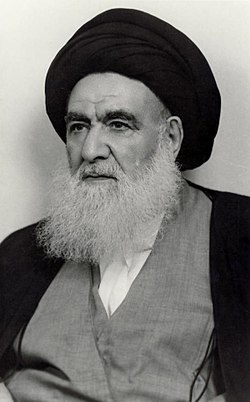Top Qs
Timeline
Chat
Perspective
Tatbir
Self-flagellation ritual practiced by some Shia Muslims From Wikipedia, the free encyclopedia
Remove ads
Tatbir (Arabic: تطبير, romanized: Taṭbīr) is a form of self-flagellation rituals practiced by some Shia Muslims in commemoration of the killing of Imam Husayn ibn Ali and his partisans in the Battle of Karbala by forces of the second Umayyad caliph Yazid I (r. 680–683).

The ritual is practiced in the Islamic month of Muharram, usually on Ashura. Tatbir involves striking oneself with chains or swords. It has been considered haram ("forbidden") by some of the Shia clergy, who cite it as self-harm.
Remove ads
Origins
It can be firmly traced to the 19th century,[1] where it was first introduced by Azerbaijani Turkmen from various Qizilbash tribes as a cultural practice – since engaging in self-flagellation was already widespread among turkic peoples at the time as a popular way of mourning, which they likely inherited from the Scythians;[2] both Turkic and Scythic peoples were previously recorded as having engaged in self-flagellation on the deathdate of Buddha, as well as on that of the Zoroastrian hero Siyavash, and the Scythian hero Targitaos[3][4][5][6]
It used to be relatively uncommon for non-Turkic peoples to engage in, until it was standardized in Tehran by the Azerbaijani cleric Fazel Darbandi, after being barred from various shi'i cities for his "peculiarities."[7]
He would weep violently, lacerate his face [i.e with knives], throw off his turban, and sometimes even throw himself from the minbar to the ground.
— M. A. Modarres, Rayḥānat al-adab
Remove ads
Practice

Tatbir, also called Zanjeer Zani or Qama Zani,[8] is practiced by some Shia Muslims on the day of Ashura on the 10 Muharram of the Islamic calendar and on the 40th day after Ashura, known as Arba'een (or Chehelom in Persian) by Twelver Shias around the world.[9][10] Some Shia may also perform tatbir on other occasions as well.
The practice of Tatbir includes striking oneself with a talwar, a type of sword, on the head, causing blood to flow in remembrance of the pain felt by Husayn ibn Ali. Some also hit their back and/or chest with blades attached to chains.
Remove ads
Fatwas
Summarize
Perspective
Tatbir are contested among Shia clerics.[11] While some traditionalist clerics allow believers to indulge in tatbir, modernist clerics deem it impermissible because it is considered self-harm, thus haram in Islam.[12] Most religious authorities associate all forms of self-flagellation and blood-letting as ways to relate to painful deaths during the battle of Karbala by Imam Husayn and supporters.[13]

Remove ads
Criticisms
- There are different opinions about the practice of Tatbir. Some Shia Marja believe that it is a form of self-harm, so it must be forbidden. According to some Shia Marja, it is felt that Tatbir reflects poorly on Shia observers, so they typically advise avoiding it in a region where Sunnis also reside.
- Iraqi sociologist Ibrahim al-Haidari has called Tatbir an irrational act. He states blood donations should replace Tatbir. Iraqi cleric Hussein Al-Sadr and his followers donate blood every year during the mourning of Husayn ibn Ali.[49]
- Hassan Nasrallah, the former leader of Hezbollah in Lebanon, had also taken steps to end Tatbir. Instead of practicing Tatbir, he had offered to donate blood on Ashura day to patients who need it.[50]
- Mohammad Mehdi Shamseddine established a blood bank in Najaf to donate blood on Ashura day to patients who need it.[51]
Remove ads
See also
References
External links
Wikiwand - on
Seamless Wikipedia browsing. On steroids.
Remove ads






















